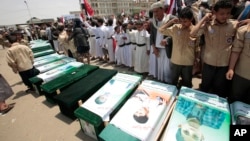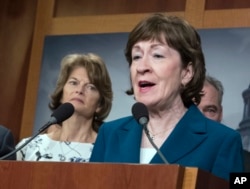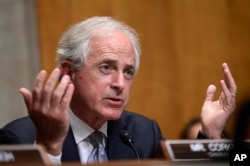U.S. lawmakers of both political parties rejected the Trump administration's determination that Saudi Arabia and the United Arab Emirates are doing enough to prevent civilian casualties in Yemen, where Saudi coalition airstrikes have killed thousands of noncombatants.
"I do not agree with that [determination]," Republican Senator Susan Collins of Maine told VOA on Wednesday. "I've been very concerned about the humanitarian disaster in Yemen and the role that the Saudi bombing has played."
New Mexico Democratic Senator Tom Udall echoed Collins.
"I think they [Saudi-led coalition] have been careless, and I think there is a lot more we could do to make sure this effort is run in a humane way," Udall said.
Earlier in a statement, U.S. Secretary of State Mike Pompeo said he certified to Congress that Saudi Arabia and the United Arab Emirates are "undertaking demonstrable actions to reduce the risk of harm to civilians and civilian infrastructure resulting from military operations of these governments."
He did not elaborate.
WATCH: Pompeo Certifies Saudi-led Coalition Taking Steps to Reduce Deaths in Yemen
Congress had given Pompeo until Sept. 12 to certify the coalition is taking steps to reduce civilian deaths. If it hadn't done so, the U.S. would be prohibited from refueling Saudi aircraft. The U.S. also provides the coalition targeting information, logistical support and weapons.
In a statement, U.S. Defense Secretary Jim Mattis said he endorses and fully supports the determination that the coalition is "making every effort to reduce the risk of civilian casualties and collateral damage to civilian infrastructure."
The chairman of the Senate Foreign Relations Committee, Republican Bob Corker of Tennessee, disagreed.
"I don't think we've got any good actors there [in the Yemeni conflict], so I don't know that I want to second that [administration determination]," Corker told VOA. "I think all parties could be doing a much better job of protecting civilians, including the Saudis."
The Saudi-led coalition admitted last month "mistakes were made" in an August bus bombing that killed dozens of children. It vowed to hold responsible those who bombed the bus and said it would improve its targeting procedures.
Sarah Margon, the Washington director of Human Rights Watch, said in a tweet that Pompeo's determination was based on "farcical analysis."
Asked if U.S. cooperation with the Saudi coalition should be curbed, Collins said, "I'm not saying there should be a curtailment, but I think we may need to look at putting more restriction on arms that we [the United States] provide [to the coalition]."
The Senate's No. 2 Republican, John Cornyn of Texas, argued that any American withdrawal of support could make a bad humanitarian situation worse.
"In the absence of American help, I think the collateral damage and the humanitarian crisis would be even more serious," Cornyn said.
The three-year-old conflict in Yemen has killed more than 10,000 people, with millions facing starvation and disease.
The Saudi-led coalition has been fighting Houthi rebels since 2014, when the Houthis seized the capital. The coalition is trying to restore the government of President Abd-Rabbu Mansour Hadi.
VOA's Michael Bowman contributed to this report.









